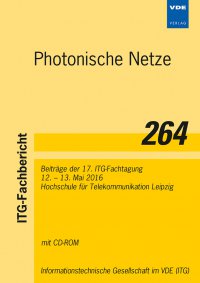Experimental Comparison of 56 Gbit/s PAM-4 and DMT for Data Center Interconnect Applications
Konferenz: Photonische Netze - 17. ITG-Fachtagung
12.05.2016 - 13.05.2016 in Leipzig, Deutschland
Tagungsband: Photonische Netze
Seiten: 5Sprache: EnglischTyp: PDF
Persönliche VDE-Mitglieder erhalten auf diesen Artikel 10% Rabatt
Autoren:
Eiselt, Nicklas (Technical University of Denmark (DTU), Department of Photonics Engineering, Ørsteds Plads, Build. 343, 2800, Denmark & ADVA Optical Networking SE, Märzenquelle 1-3, 98617 Meiningen-Dreißigacker, Germany)
Dochhan, Annika (ADVA Optical Networking SE, Märzenquelle 1-3, 98617 Meiningen-Dreißigacker, Germany)
Griesser, Helmut (ADVA Optical Networking SE, Fraunhoferstr. 9a, 82152 Martinsried / Munich, Germany)
Vegas Olmos, Juan Jose; Monroy, Idelfonso Tafur (Technical University of Denmark (DTU), Department of Photonics Engineering, Ørsteds Plads, Build. 343, 2800, Denmark)
Inhalt:
Four-level pulse amplitude modulation (PAM-4) and discrete multi-tone transmission (DMT) in combination with inten-sity modulation and direct-detection are two promising approaches for a low-power and low-cost solution for the next generation of data center interconnect applications. We experimentally investigate and compare both modulation formats at a data rate of 56 Gb/s and a transmission wavelength of 1544 nm using the same experimental setup. We show that PAM-4 outperforms double sideband DMT and also vestigial sideband DMT for the optical back-to-back (b2b) case and also for a transmission distance of 80 km SSMF in terms of required OSNR at a FEC-threshold of 3.8e-3. However, it is also pointed out that both versions of DMT do not require any optical dispersion compensation to transmit over 80 km SSMF while this is essential for PAM-4. Thus, implementation effort and cost may be lower for DMT. Furthermore, the dispersion tolerance of PAM-4 in dependence of a feedforward equalizer (FFE) is investigated.


